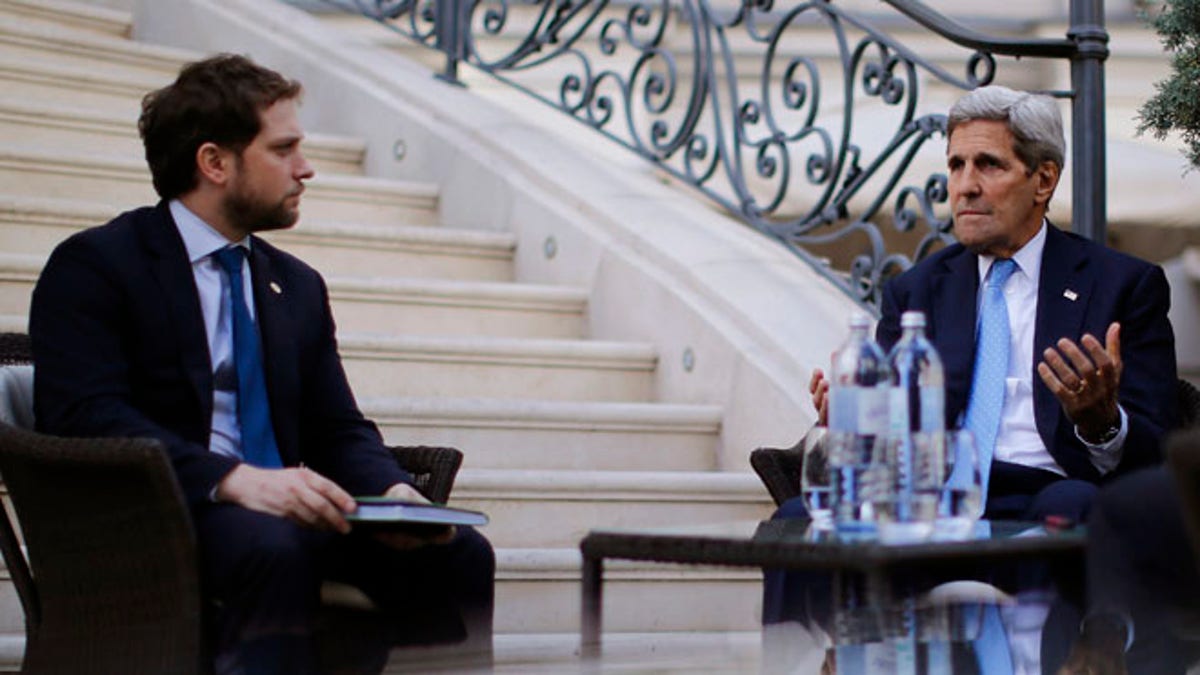
July 10, 2015: Secretary of State John Kerry, right, and State Department Chief of Staff Jon Finer at the Iran nuclear talks, Vienna, Austria. (AP)
World leaders missed their Saturday deadline on an Iran nuclear deal, the third since talks resumed in late June as negotiators struggle to agree on such key points as lifting sanction and international site inspections.
The talks, which began roughly two years ago, are an attempt by the United States and five other world powers to get long-term, verifiable curbs on Iran's nuclear programs in exchange for sanction relief.
However, the most recent negotiations in Vienna that began June 30 have largely come down to one-on-one talks between Secretary of State John Kerry and Iranian Foreign Minister Mohammad Javad Zarif.
Both countries in recent days have threatened to walk away but have set a new Monday deadline.
On Friday, Zarif accused the U.S. of shifting its demands and dismissed a warning that Washington was ready to quit the negotiations.
Hours after his comments, Zarif met again with Kerry for another attempt at resolving the differences standing in the way of a deal that world leaders say will curtail Iran’s efforts to create a nuclear weapon.
Afterward, Kerry spoke of progress, while acknowledging a "couple of very difficult issues" still blocking a deal. And despite the sharp public comments by both sides, he said the negotiating atmosphere was "very constructive."
The tougher rhetoric Friday mirrored the frustrations by the sides as the current round of talks entered its 14th day. After blowing past two extensions, negotiators had hoped to wrap up the talks by Friday, but Zarif's comments cast doubts that agreement was near.
Washington had hoped to seal a deal before the end of Thursday to avoid delays in implementing their promises.
By missing that target, the U.S. and Iran now have to wait for a 60-day congressional review period during which President Obama cannot waive sanctions on Iran. Had they reached a deal by then, the review would have been only 30 days.
Iran is unlikely to begin a substantial rollback of its nuclear program until it gets sanctions relief in return. The country also says it program is not to create a nuclear weapon.
Though the talks now essentially involve the U.S. and Iran, disagreements also have surfaced recently between Washington and Russia.
Moscow supports Iranian demands for at least a partial lifting of the conventional arms embargo as part of any deal, which Washington opposes.
Kerry warned Thursday the Americans were ready to leave the talks, declaring "we can't wait forever for a decision to be made."
Zarif, in contrast, said his side was ready to stay and work for a "dignified and balanced deal."
Foreign ministers or top deputies of all seven nations are expected to join the talks before any impending deal.
But while Germany's foreign minister remains in Vienna, the Russians and Chinese left days ago, and their French and British counterparts followed Friday, reflecting the lack of substantial advances.
The scope of access to U.N. inspectors monitoring Iran's nuclear program remains one of the sticking points in the talks. The Americans want no restrictions, whereas Iranian officials say they are concerned that unrestricted monitoring could be a cover for Western spying.
Diplomats say Iran's negotiators have signaled willingness to compromise on the issue, but hardliners in Iran remain opposed to broad U.N. inspections. In a message directed to "negotiators on both sides," Iran's military spokesman, Gen. Masoud Jazayeri, told Iran's Fars news agency that "access to the military sites will not be allowed under any circumstance."
The Associated Press contributed to this story.




